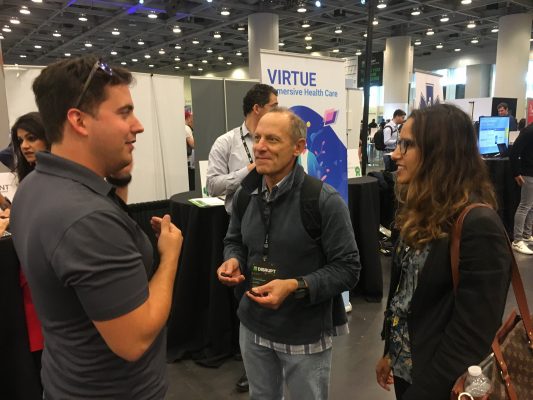A few weeks ago, CCI and our Technology Hub teams attended TechCrunch Disrupt, the startup conference of all startup conferences.
Here’s what we learned:
1) Be open to adapting concepts, processes, and practices from industries outside of health care…
We love learning from analogous examples: Our Innovation Safaris are evidence of that! As the world becomes more interconnected, it’s important to ask, “How might we pick up something we take for granted in one arena of our lives and mold it into an innovative practice for health care?” For example, how can we adapt the concept of food delivery, like Door Dash and Uber Eats, to pharmacy delivery for our members?
More analogous inspiration came from a “Brand Ambassadors” talk, taking lessons from campus representative marketing to inform provider engagement and get stakeholders more excited/invested in our programs: Timing and messaging are key to success. Also, socialize ideas early on, like during provider recruitment process, and to be authentic, try marketing multiple ideas together, across different audiences and channels.
2) …especially as “bleeding edge” technologies continue to develop and grow, inside and outside of the health care world.
Many of the workshops and talks focused on explaining the use of AI, VR, voice technology, blockchain, and every hybrid thereof. As these technologies mature and branch into other industries, we got to thinking about implications for the health sector:
- Patient privacy, patient expectations: During a Q&A about the future of voice technology, the CEO of one voice-technology startup was somewhat cavalier about the harvesting and use of identifiable user information from their devices. As the use of voice technology becomes more commonplace — from Alexa and Google Home to AI medical scribes — it’ll be interesting to see how those with “more cavalier” attitudes clash with existing policies and patient expectations around privacy.
- Future of health care workforce: Kai-Fu Lee, Chairman and CEO of Sinovation Ventures and ex-President of Google China, mentioned what jobs would be preserved or in more demand as AI begins to assume responsibility of some of the more repetitive tasks. When he reviewed the health care sector, the jobs he mentioned that would be safe were social workers and nurse practitioners; he did not mention physicians.
- Investing in infrastructure for the future: Leveraging data science and technology can’t be an add-on to your strategy and operations; they need to be part of the “substrate” that every organizational decision is built upon.
3) The future is now!
- AI is more developed than I thought: After seeing many of the companies at the conference, it’s clear that AI will eventually change nearly every major industry.
- Virtual and augmented reality are going to change the way people learn and experience the world in surprising ways. We saw that one Taiwanese startup has replicated human anatomy in virtual form — you can actually step “inside” the body and isolate different systems. Cadaver-free learning!

4) More and more, we’re talking about justice, equity, and diversity in tech.
- The tech world hasn’t had the best record of inclusiveness and representation. I was surprised to see a very prominent code of conduct displayed throughout the conference, as well as in the handbook. There was also a specific content track around Justice and Diversity, and specific networking opportunities available exclusively for women in tech.
- There is still tremendous gender bias in the tech world. It was sad to hear some of the stories female engineers and founders shared. At the same time, it was inspirational to hear how some female founders were making HR, salary, and promotions more equitable within their companies.
- I really appreciated the talk on “Creating a Lifeline in Communities.” It was great to learn about the grassroots efforts to create technologies that work to serve the underserved communities. The CEOs on this panel — Neil Shah of Concrn, Phaedra Ellis-Lamkins of Promise, Rose Afriyie of mRelief, and Frederick Hutson of Pigeonly — had lived experiences with hunger, incarceration, substance use, and mental health, so they empathize with and understand the end-users of this technology. It made me realize that when pursuing partnerships, we must carefully consider how well potential partners understand the population we serve.

- I was not aware that there were several startups that offered their services to help families separated at the U.S. border. Some were controversial and not accepted by the community they were reaching out to, however, it will be interesting to see if a trend is forming that will lead to more collaborative efforts between activists and startups.
Thanks to Technology Hubs members Anshu Abhat, Daniel Turner-Lloveras, Ella Schwartz, Grace Chu, Mike Aratow, and Laura Blumenthal for contributing takeaways to this article!

Find this useful or interesting? We’re constantly sharing stuff like this. Sign up to receive our newsletter to stay in the loop.



